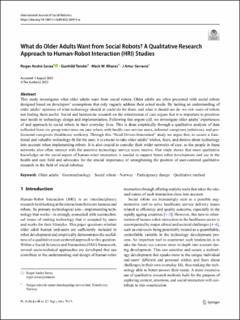What do Older Adults Want from Social Robots? A Qualitative Research Approach to Human-Robot Interaction (HRI) Studies
Peer reviewed, Journal article
Published version
Permanent lenke
https://hdl.handle.net/11250/3052956Utgivelsesdato
2022Metadata
Vis full innførselSamlinger
Sammendrag
This study investigates what older adults want from social robots. Older adults are often presented with social robots designed based on developers’ assumptions that only vaguely address their actual needs. By lacking an understanding of older adults’ opinions of what technology should or could do for them–and what it should not do–we risk users of robots not finding them useful. Social and humanistic research on the robotization of care argues that it is important to prioritize user needs in technology design and implementation. Following this urgent call, we investigate older adults’ experiences of and approach to social robots in their everyday lives. This is done empirically through a qualitative analysis of data collected from six group interviews on care robots with health care service users, informal caregivers (relatives), and professional caregivers (healthcare workers). Through this “Need-Driven-Innovation” study we argue that, to secure a functional and valuable technology-fit for the user, it is crucial to take older adults’ wishes, fears, and desires about technology into account when implementing robots. It is also crucial to consider their wider networks of care, as the people in these networks also often interact with the assistive technology service users receive. Our study shows that more qualitative knowledge on the social aspect of human-robot interaction is needed to support future robot development and use in the health and care field and advocates for the crucial importance of strengthening the position of user-centered qualitative research in the field of social robotics.

